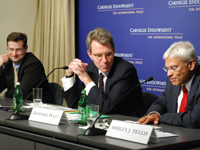Registration
You will receive an email confirming your registration.
On the eve of President Obama’s trip to India, Ashley J. Tellis previewed Obama’s visit and presented his latest paper, Obama in India: Building a Global Partnership: Challenges, Risks, Opportunities, which articulates the strategic value of a strong U.S.-India relationship, at an event hosted by Carnegie. Principal Deputy Assistant Secretary of State Geoff Pyatt moderated the session and offered opening remarks while Daniel Markey from the Council on Foreign Relations provided comments on the paper.
Recent Listlessness
Recently, many commentators have begun to describe U.S.-Indian relations as listless and unfocused. Tellis argued that the bilateral relationship is fundamentally strong and predicted President Obama’s upcoming visit to the country would be highly successful.
- The Totality of Relations: Though official ties between Washington and New Delhi have sometimes shown strain, Tellis described overall relations as a stunning success, driven by individual interactions and business ties.
- Official Drift: While bilateral relations have improved in recent years, domestic factors in both countries—ranging from the economic crisis to domestic electoral concerns to regional interactions with Afghanistan, Pakistan, and China—have slowed progress toward shared goals, Tellis admitted.
- Benign Neglect: In many ways, the perceived neglect shown by the United States toward India is a testament to India’s success, Tellis said. In a region filled with dangerous security challenges and weak states, India stands out as a stable, successful country that can be ignored without dangerous consequences.
The Importance of the Relationship
President Obama understands the strategic importance of a strong relationship with India, Tellis contended. He listed three primary reasons the relationship is important:
- A Stable Balance of Power in Asia: The United States must maintain good relations with key democratic parties in the region to maintain stability and a favorable order to Asian politics, Tellis said. If anything, he argued, America’s interest in Asia’s balance of power will grow over time, increasing the utility of the U.S.-Indian relationship.
- India’s Economic Growth: As India’s economy grows, more opportunities for commercial and societal engagement with the United States will arise. Tellis argued that, in spite of some bilateral tensions, the connections between the two nations will only increase.
- Democracy: At the end of the day, the convergence in democratic values between the United States and India will allow the two nations to overcome petty disagreements and provide concrete benefits to both, Tellis stated.
President Obama’s Trip
The president’s visit will demonstrate the importance of this bilateral relationship on a number of issues, but Tellis warned challenges remain that threaten to disrupt U.S.-Indian relations.
- Obama’s Mission: The president’s trip will reflect U.S. interests in India in several ways, Tellis said. It will give Obama a chance to show America’s commitment to helping grow India’s national capabilities and to demonstrate solidarity with the democratic country. The trip will also reflect the administration’s efforts to integrate India into global institutions and look toward common goals such as a stable South Asia and a modern powerful India.
- Challenges: In the move toward better relations, many obstacles will exist on both sides. India must sustain America’s attention as the United States faces domestic and international challenges, while the United States government must overcome bureaucratic inertia and internalize and implement the president’s agenda of enhanced engagement with India.
- United Nations Security Council: One of the most meaningful things that President Obama could do, Tellis suggested, is to publicly support a permanent seat for India on the United Nations Security Council. An Indian seat is nearly inevitable and Tellis argued it is better for the United States to support India now rather than after the issue is decided without U.S. input. He also said the United States should work to integrate India into the arms control regimes that serve to stem proliferation and increase international security.
The Future of the Relationship
The United States must do what it can to integrate India into the international system and assist its growth, both for India’s sake and for its own, Tellis said.
- Leaving Things to Chance: Although external factors such as deepening economic ties and the pressures of a rising China suggest that India and the United States will continue to grow closer regardless of how much emphasis Washington places on the relationship, Tellis said the relationship is important enough to both countries that it warrants the extra effort.
- Biggest Threats: Tellis identified three primary threats to the relationship’s long-term success.
- Routine: One concern he expressed is that Indians and Americans will view the relationship as routine, when it has the potential to be far more powerful.
- Short term: The pressures on the current U.S. administration could reduce both the president’s trip and the bilateral relationship itself to a series of tactical and transactional matters, losing sight of the larger goals that motivate both states.
- Regional Tensions: The United States may face some difficulty in addressing Indian concerns about high politics in South Asia, particularly U.S. relations with Pakistan and China. Tellis suggested that transparency from both governments and an awareness of the limits of American capabilities is essential.
- Routine: One concern he expressed is that Indians and Americans will view the relationship as routine, when it has the potential to be far more powerful.
